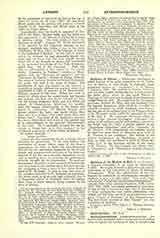

Anthony of the Mother of God (A. DE OLIVERA), a Spanish Carmelite, b. at Leon in Old-Castile; d. 1641. He taught Aristotle‘s dialectics and natural philosophy at the University of Alcala de Henares (Complutum). With the collaboration of his colleagues, he undertook an encyclopedia intended for students in arts and philosophy. This work, originally styled “Collegium Complutense philosophicum” (Alcala, 1624; other editions Frankfurt, 1629; Lyons, 1637, 1651, 1668), was highly esteemed by Thomists. It was at first a treatise on logic; but in the course of time, metaphysics and moral philosophy were added, and the work served as an introduction to the great “Course of Theology” of the Salmanticenses. The first three volumes of this “Course” are also attributed to Anthony.
JOHN J. A’ BECKET

